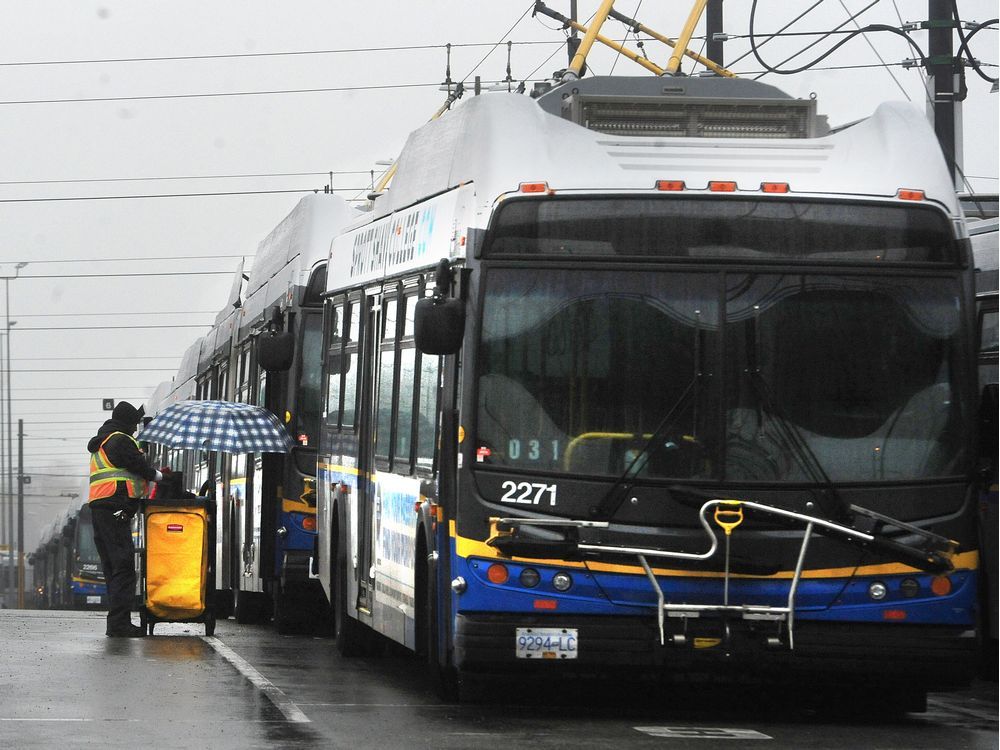Bus, SeaBus shutdown will hit harder than in 2001

Credit to Author: Jennifer Saltman| Date: Sat, 23 Nov 2019 01:49:14 +0000
The last major transit strike in Metro Vancouver was 18 years ago, and those who had a front-row seat say that with more people using transit now, the impact could be much worse if bus and SeaBus workers walk off the job next week.
Picketing is expected to begin on Wednesday, an escalation of job action that started on Nov. 1, with bus drivers refusing to wear uniforms and overtime bans for maintenance workers and later bus drivers.
Contract talks between Unifor, which represents the 5,000 transit workers, and their employer, Coast Mountain Bus Company, broke off for the second time last week, and no bargaining sessions are scheduled.
SkyTrain workers, who operate and maintain the Expo and Millennium lines, will return to bargaining with B.C. Rapid Transit Company this weekend ahead of planned mediation sessions next week.
As spokesperson for TransLink in 2001, Ken Hardie has clear memories of the last strike, which started when bus drivers and mechanics put up picket lines on April 1. That job action lasted for 123 days, until they were legislated back to work.
“It was a long one,” said Hardie, who is now a Liberal MP starting his second term. “There’s a significant loss in productivity when a major part of your transport network goes down like that, not only the fact that some people can’t get to work easily, but everybody else who will drive are going to see a lot more company out on the roads.”
Delta Coun. Lois Jackson was almost two years into her first term as mayor in April 2001, and recalls people walking, biking, carpooling and foregoing unnecessary trips during the strike.
“I think in the beginning it was kind of a shock to everybody, but as the days wore on, people found other alternate methods,” Jackson said. “It wasn’t easy, but people found their way, any way, to get to work.”
She said a lot more people will be affected and the weather and school breaks certainly won’t be in their favour this time around, but she believes, like before, people will adapt if the buses and SeaBus are shut down.
Metro Vancouver’s population has grown by about half a million people since 2001, and the transit system has seen double-digit increases in ridership in recent years, with 439.5 million boardings on the conventional system in 2018.
According to the 2001 Census, 11 per cent of people in Metro Vancouver used public transit to commute, and in 2016, the last Census, 21 per cent of commuters in the region took transit.
The bus system accounts for almost two-thirds of all transit journeys in the region.
Since the last strike, the number of daily bus boardings has increased by more than 60 per cent, from 570,000 in 2001 to an average of 931,000 each weekday in 2018.
The number of boardings for SeaBus has also increased, from 18,240 each day in 2001 to 19,690 on an average weekday in 2018.
Since the 2001 strike, TransLink has added three SkyTrain extensions: the Millennium Line, which opened in January 2002, the Canada Line, which opened in August 2009 and the Evergreen extension to the Millennium Line, which opened in December 2016. It has also since added about 500 buses and one SeaBus.
“Every year that goes by there’s more people relying on transit, and it’s always a real shame when the system doesn’t deliver to people who have come to rely on it,” said Hardie. “That’s very counterproductive because now people are going to be eyeing using the car again a little bit more if they can’t count on the bus or the SkyTrain to work.”
Ridership took a big hit thanks to the strike, with the number of boardings system-wide dropping to 160.9 million for 2001, compared to 229.7 million the previous year and 255.7 million the year after the strike.
Ujjal Dosanjh, who was the NDP premier when the strike started, remembers feeling helpless. Just two weeks after picket lines went up, a provincial election was called and his government was powerless to do anything. He said those who were hurt the most were those who could least afford it — students and workers with lower incomes.
“I don’t know why the new government didn’t deal with it quickly,” Dosanjh said.
His advice is to make sure this labour dispute doesn’t drag on as long as the 2001 strike.
“I know the rote response from any government, particularly from a social democratic government, is let the free collective bargaining work. There is some sense to that, there is no question, but if you have a much larger number of users now dependent on transit, then it becomes a lot more difficult to see it going longer than a few weeks,” he said.